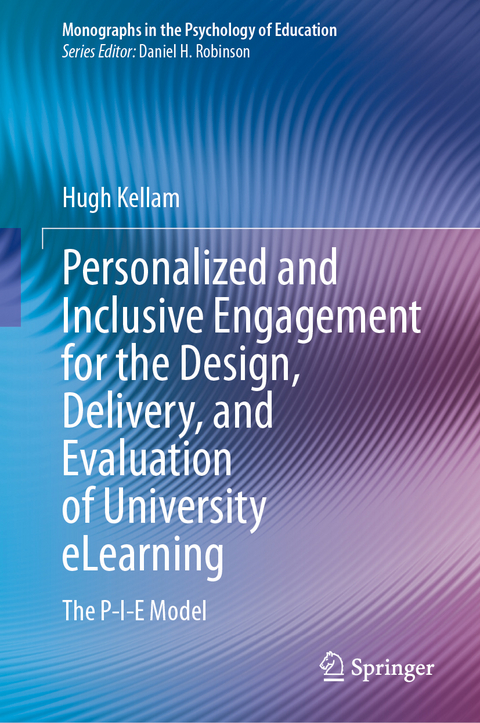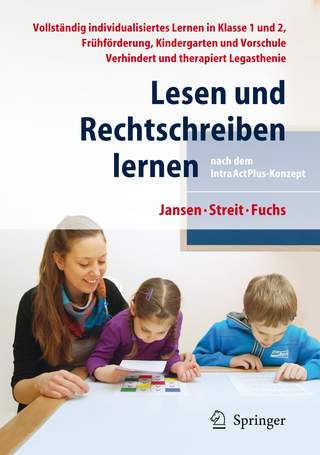
Personalized and Inclusive Engagement for the Design, Delivery, and Evaluation of University eLearning
Springer International Publishing (Verlag)
978-3-031-49128-3 (ISBN)
The book examines the intersections of online learning theories and models in the current research literature for teaching in digital environments in postsecondary education. It describes the connection between eLearning theory and practice to develop a pragmatic and adaptable model for the design, development, and implementation of interactive, personalized, and inclusive online learning experiences. The book discusses a model with three themes - personalization, inclusiveness, engagement (the P-I-E model) - that describe facilitation techniques, instructional design methods and evaluation tools to customize eLearning for higher education students. It offers theoretical underpinnings, implementation tips, a design checklist and evaluation questions for each of the model's sections. In addition, the book presents an implementation plan for the elements of the model based on principles of change management and program planning. The volume can be used as either a comprehensive systemto design an entire online course or as a reference guide to improve selected components of an existing program.
Key areas of coverage include:
- Review of eLearning theories.
- Examination of the characteristics of individual learners, professors, and class communities in online environments.
- Recommendations for instructional design, assessment, and evaluation for online students.
- Best practices for learner engagement including scheduling, communication, and user interface design.
- Program implementation strategies and evaluation questions for all sections of the P-I-E model.
Personalized and Inclusive Engagement for the Design, Delivery, and Evaluation of University eLearning is an essential resource for instructional designers, college instructors, and university professors to create, implement, evaluate, and improve personalized and inclusive learning for postsecondary students.
lt;p>Hugh J. D. Kellam, Ph.D., M.Ed., B.Ed., CTDP, is an Assistant Professor in the College of Education at the University of Texas at Arlington. He designed and developed the Instructional and Learning Design Technology Master's and Certificate Programs and serves as the Program Coordinator. He has also developed online learning courses for the University of Ottawa, the Northern Ontario School of Medicine and Georgian College. He has published more than 15 articles with a focus on online learning design and evaluation. Dr. Kellam has worked for more than 20 years as a teacher, professor, and manager in various learning environments, including corporate, elementary and secondary public schools as well as colleges and universities. He has a Ph.D. from the University of Ottawa in Teaching, Learning and Evaluation, with a focus on mobile and online learning. His research goal is to develop frameworks and models that promote experiential, motivational, inclusive, and differentiated virtual learning environments. He believes that contextual, experiential, and personalized online learning activities are the way to engage students of all ages.
Chapter 1. Why Another Online Learning Theory?.- Chapter 2. The Online Teacher as Facilitator and Coach: Personalized eLearning.- Chapter 3. The Online Student: Let Them Lead and Thrive: Personalized eLearning.- Chapter 4. Developing Online Collaborative Communities: Personalized eLearning.- Chapter 5. Instructional Design Strategies for Self-Directed Online Learning: Inclusive eLearning.- Chapter 6. Inclusion Through Diversity and Differentiation: Inclusive eLearning.- Chapter 7. Evaluation and Feedback that Foster Online Learner Self-Efficacy: Inclusive eLearning.- Chapter 8. Scheduling as a Pathway for Learner Success: Online Engagement.- Chapter 9. Communication Strategies for Clear, Concise and Consistent eLearning: Online Engagement.- Chapter 10. User Interface Design for Personalized Success Paths: Online Engagement.- Chapter 11. Change Management and Program Planning for eLearning Design: Implementation Plan.
| Erscheinungsdatum | 26.01.2024 |
|---|---|
| Reihe/Serie | Monographs in the Psychology of Education |
| Zusatzinfo | XIII, 138 p. 26 illus., 25 illus. in color. |
| Verlagsort | Cham |
| Sprache | englisch |
| Maße | 155 x 235 mm |
| Gewicht | 385 g |
| Themenwelt | Geisteswissenschaften ► Psychologie ► Pädagogische Psychologie |
| Medizin / Pharmazie ► Medizinische Fachgebiete ► Psychiatrie / Psychotherapie | |
| Schlagworte | Adult learning, online environments, education • Change management, program planning, eLearning design • Collaborative communities, shared knowledge, eLearning • Culturally responsive teaching, eLearning • Diversity, differentiation, inclusion, eLearning • eLearning Differentiation, online learning theory • eLearning, inclusive teaching, postsecondary education • Encouragement, reinforcement, digital learning • Evaluation, feedback, efficacy, eLearning • Formative assessments, online self-efficacy, students • Inclusive eLearning, motivation, reflection, students • Instructional design strategies, online learning • Instruction design model, eLearning, program planning • Interface design, efficiency, familiarity, comfort, eLearning • Online teacher, facilitator, coach, personalized eLearning • Self-directed learning, students, college, university • Self-regulatory skills, online learning, students • Teacher presence, communication, online learning • Time management, online learning, students • Universal design, accessibility, transformative eLearning |
| ISBN-10 | 3-031-49128-9 / 3031491289 |
| ISBN-13 | 978-3-031-49128-3 / 9783031491283 |
| Zustand | Neuware |
| Informationen gemäß Produktsicherheitsverordnung (GPSR) | |
| Haben Sie eine Frage zum Produkt? |
aus dem Bereich


